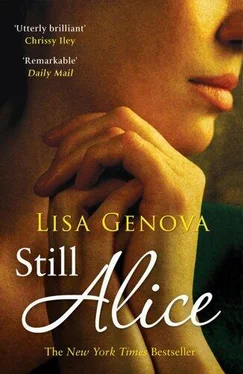John had agreed to walk with her to Harvard every morning. She'd told him she didn't want to risk getting lost. In truth, she simply wanted that time back with him, to rekindle their former morning tradition. Unfortunately, having deemed the risk of being run over by a car less than that of being injured from slipping on the icy sidewalks, they walked single file in the street, and they didn't talk.
Gravel kicked up into her right boot. She debated whether to stop in the road to empty it out or wait until they reached Jerri's. To empty it, she'd have to balance in the road on one foot while exposing the other to the frigid air. She decided to endure the discomfort for the remaining two blocks.
Located on Mass Ave about halfway between Porter and Harvard squares, Jerri's had become a Cambridge institution for the chronically caffeinated long before the invasion of Starbucks. The menu of coffee, tea, pastries, and sandwiches written in chalk capital lettering on the board behind the counter had remained unaltered since Alice's graduate student days. Only the prices next to the items showed signs of recent attention, outlined with chalk dust in the shape of a rectangular school eraser and printed in a penmanship belonging to someone other than the author of the offerings to their left. Alice studied the board, perplexed.
"Good morning, Jess, a coffee and a cinnamon scone, please," said John.
"I'll have the same," said Alice.
"You don't like coffee," said John.
"Yes, I do."
"No, you don't. She'll have a tea with lemon."
"I want a coffee and a scone."
Jess looked to John to see if there would be a return, but the volley was dead.
"Okay, two coffees and two scones," said Jess.
Outside, Alice took a sip. It tasted acrid and unpleasant and poorly reflected its delicious smell.
"So how's your coffee?" asked John.
"Wonderful."
As they walked to campus, Alice drank the coffee she hated to spite him. She couldn't wait to be alone in her office, where she could throw away what was left of the wretched beverage. Plus, she desperately wanted to empty the gravel out of her boot.
BOOTS OFF AND COFFEE IN the trash, she tackled her inbox first. She opened an email from Anna.
Hi Mom, We'd love to go to dinner, but this week is kind of tough with Charlie's trial. How about next week? What days are good for you and Dad? We're free any night but Thursday and Friday. Anna She stared down the tauntingly ready, blinking cursor on her computer screen and tried to imagine the words she wanted to use in her reply. The conversion of her thoughts to voice, pen, or computer keys often required conscious effort and calm coaxing. And she held little confidence in the spelling of words she'd long ago been rewarded for her mastery of with gold stars and teachers' praise.
The phone rang.
"Hi, Mom."
"Oh good, I was just about to return your email."
"I didn't send you an email."
Unsure of herself, Alice reread the message on her screen.
"I just read it. Charlie has a trial this week--"
"Mom, this is Lydia."
"Oh, what are you doing up so early?"
"I'm always up now. I wanted to call you and Dad last night, but it was too late your time. I just got an incredible part in a play called The Memory of Water. It's with this phenomenal director, and it's going up for six shows in May. I think it's going to be really good, and with this director it should get a lot of attention. I was hoping maybe you and Dad could come out to see me in it?"
Cued by the hanging rise in her inflection and the silence that followed, Alice knew it was her turn to speak but was still catching up to all that Lydia had just said. Without the aid of the visual cues of the person she talked to, conversations on the phone often baffled her. Words sometimes ran together, abrupt changes in topic were difficult for her to anticipate and follow, and her comprehension suffered. Although writing presented its own set of problems, she could keep them hidden from discovery because she wasn't restricted to real-time responding.
"If you don't want to, you can just say it," said Lydia.
"No, I do, but--"
"Or you're too busy, whatever. I knew I should've called Dad."
"Lydia--"
"Never mind, I gotta go."
She hung up. Alice had been about to say that she needed to check with John, that if he could break away from the lab, she'd love to come. If he couldn't go, however, she wouldn't fly across the country without him, and she'd have to make up some excuse. Fearful of getting lost or confused far from home, she'd been avoiding travel. She'd declined an offer to speak at Duke University next month and thrown out the registration material for a language conference she'd attended every year since she was a graduate student. She wanted to see Lydia's play, but this time, her attendance would be at the mercy of John's availability.
She held the phone, thinking about trying to call Lydia back. She hung up, thinking better of it. She closed her unwritten reply to Anna and opened a new email to send to Lydia. She stared at the blinking cursor, her fingers frozen on the keyboard. The battery in her brain was running low today.
"Come on," she urged, wishing she could attach a couple of jumper cables to her head and give herself a good, strong zap.
She didn't have time for Alzheimer's today. She had emails to return, a grant proposal to write, a class to teach, and a seminar to attend. And at the end of the day, a run. Maybe a run would give her some clarity.
ALICE TUCKED A PIECE OF paper with her name, address, and phone number in her sock. Of course, if she became so confused that she didn't know her way home, she might not have the presence of mind to remember that she carried this piece of helpful information on her person. But it was a precaution she took anyway.
Running was becoming less and less effective at clearing her thoughts. In fact, these days, she felt more like she was physically chasing down the answers to an interminable stream of runaway questions. And no matter how hard she kicked, she could never catch them.
What should I be doing? She took her medications, slept for six to seven hours a night, and clung to the normalcy of day-to-day life at Harvard. She felt like a fraud, posing as a Harvard professor without a progressive neurodegenerative disease, working every day as if everything were just fine and would continue that way.
There weren't a lot of metrics for performance or day-today accountability in the life of a professor. She didn't have books to balance, a certain quota of widgets to make, or written reports to hand in. There was room for error, but how much? Ultimately, her functioning would deteriorate to a level that would be noticed and not tolerated. She wanted to leave Harvard before then, before the gossip and pity, but had no way of even guessing when that would be.
And although the thought of staying on too long terrified her, the thought of leaving Harvard terrified her much, much more. Who was she if she wasn't a Harvard psychology professor?
Should she try to spend as much time as possible with John and her children? What would that mean practically? Sit with Anna while she typed her briefs, shadow Tom on his rounds, observe Lydia in acting class? How was she supposed to tell them that they each had a 50 percent chance of going through this? What if they blamed and hated her like she blamed and hated her father?
It was too soon for John to retire. How much time could he realistically take off without killing his own career? How much time did she have? Two years? Twenty?
Although Alzheimer's tended to progress more quickly in the early-onset versus late-onset form, people with early-onset usually lived with the disease for many years longer, this disease of the mind residing in relatively young and healthy bodies. She could stick around all the way to the brutal end. She'd be unable to feed herself, unable to talk, unable to recognize John and her children. She'd be curled up in the fetal position, and because she'd forget how to swallow, she'd develop pneumonia. And John, Anna, Tom, and Lydia would agree not to treat it with a simple course of antibiotics, riddled with guilt over feeling grateful that something had finally come along that would kill her body.
Читать дальше












